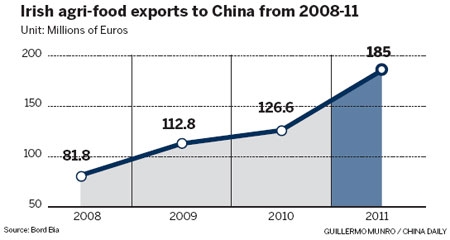Ireland relying on agri-food exports

|

|
O'Donnell says that decisions by major multinational producers of infant formula, Pfizer, Abbott and Danone, to base their manufacturing factories in Ireland is "a strong endorsement to the quality of raw materials available in Ireland, in addition to the stringent health controls in place".
Ireland is also hoping to increase meat exports to China. The meat industry, which represents 30 percent of Ireland's agri-food exports, however, faces limited scope of expansion in China as beef imports from the EU have been banned since 2000 after an outbreak of bovine spongiform encephalopathy, also known as mad cow disease.
As the largest beef exporter in Europe, Ireland hopes that the Chinese government will consider lifting the ban.
"The BSE problems are over now, and I would contend that Irish beef is probably the safest in the world," Coveney says.
O'Donnell adds that Ireland's grass-fed beef will have a competitive advantage in the Chinese market, as its specialty offal items would prove popular with Chinese consumers.
Irish pork has also managed to recover from the dioxin scare in late 2008. In September, a delegation made up of China's leading pork companies visited Ireland.
China, which was the last country to reopen its market to Irish pork following the scandal in May 2010, accounts for half the global production and consumption of pork and is expected to increase its imports significantly as domestic demand outstrips supply.
Ireland's fresh seafood is also in high demand in China.
Edward Gallagher, owner of Irish Premium Oysters, says demand for premium oysters from Hong Kong restaurants has increased significantly in recent years. From shipments of just 500 oysters a week nearly 10 years ago, exports have grown to between 20,000 and 30,000 a week.
"I firmly believe that Ireland can export 60,000 or 70,000 to China. But oysters of premium quality take a long time to grow and currently we do not have that kind of supplies," he says.
Like oysters, Irish salmon also faces the problem of limited supplies that are unable to cater to the export demand.
To overcome this challenge, Ireland's seafood board, Bord Iascaigh Mhara, is facilitating the development of three fish farms, each with an output of 30,000 tons of organic salmon each year, significantly lifting Ireland's current salmon production of 12,500 tons per year.
Coveney says that because volume is essential for exports to enter the Chinese market, Ireland hopes to steadily increase the volume of its seafood production while maintaining the quality.
"I hope I'll see lots of people in China eating Irish smoked salmon in a few years time when I visit again," he says.
Ireland's 2011 agri-food exports to China stood at around 185 million euros, according to Bord Bia estimates, representing a 46 percent growth from the 126.6 million euros in 2010.
Niu Dun, Chinese Vice-Minister for Agriculture, visited Ireland last May, during which an action plan was signed between Niu and Coveney.
The action plan agrees to share expertise in areas such as food safety, veterinary health, animal husbandry and the seafood sector. Coveney is expected to visit China in April.
Today's Top News
- Xi calls for promoting volunteer spirit to serve national rejuvenation
- Xi chairs CPC meeting to review report on central discipline inspection
- Reunification will only make Taiwan better
- Outline of Xi's thought on strengthening military published
- Targeted action plan to unleash consumption momentum
- Separatist plans of Lai slammed






























